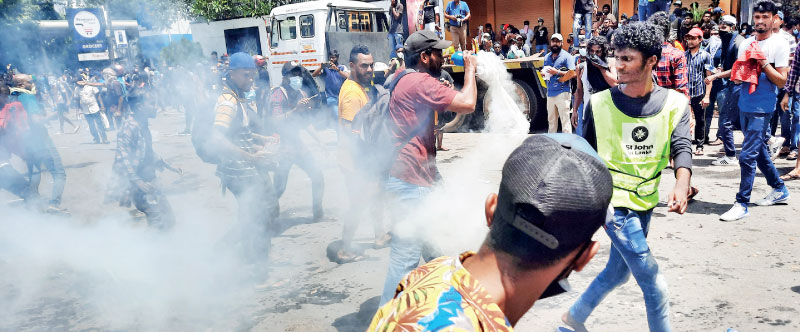Monday Feb 16, 2026
Monday Feb 16, 2026
Friday, 29 July 2022 00:50 - - {{hitsCtrl.values.hits}}

 Evidently, the Aragalaya (struggle) did not have a clear idea about the goals it hoped to achieve. Also, it did not have a clear idea about the limitations of its strength. The developments of the Aragalaya, especially the fact that President Gotabaya relinquishing the presidency and fleeing away can be considered as a special situation caused by the weak and foolish manner in which President Gotabaya Rajapaksa faced the challenge posed by the Aragalaya rather than an outcome of the strength or wisdom of the Aragalaya itself.
Evidently, the Aragalaya (struggle) did not have a clear idea about the goals it hoped to achieve. Also, it did not have a clear idea about the limitations of its strength. The developments of the Aragalaya, especially the fact that President Gotabaya relinquishing the presidency and fleeing away can be considered as a special situation caused by the weak and foolish manner in which President Gotabaya Rajapaksa faced the challenge posed by the Aragalaya rather than an outcome of the strength or wisdom of the Aragalaya itself.
Gotabaya Rajapaksa did not possess an in-depth understanding of the State or its administration. Apart from that, he could be considered as a leader who had a military (barracks) temperament and Sinhala Buddhist sectarian mind. Even before he had assumed a high position of the stature of the presidency, he had acted on a policy of mercilessly crushing all kinds of non-Buddhist and non-Sinhala struggles. But surprisingly, in regard to the recent Aragalaya which is described as the struggle of “love” by some of its proponents, President Gotabaya too, seems to have swayed with a policy of loving it rather than crushing it.
While the Aragalaya was in progress, I happened to meet the President with Herman Gunaratne, a planter and an author of books, to get the doors open for initiation of a public-oriented reform program. At the end of the discussion, I requested the President not to attack the strugglers even if they commit a mistake. I was surprised by the President’s response. He quipped instantaneously that he had cautioned the police and security forces not to resort even to a baton charge against them, let alone shooting them.
After looking into the facts, I realised that it was not a lie told by the President to please me. The President had left the residence and fled away when the angry protesters were about to break the barricade and storm the Presidential Palace. Even at that point, the President had instructed the military leaders there not to fire a single shot and that he was ready to flee the station before they entered.
Struggle for supremacy
The Aragalaya had an overestimation of its power and dominance. The reasons such as the Aragalaya people being able to occupy Colombo Galle Face Green and set up a strong campsite there, where the strugglers were able to erect makeshift tents and occupy the place, free flow of good food and other requisites without shortage to the people visiting and living there, resignation of Mahinda Rajapaksa and his Cabinet of Ministers, and thereafter, President Gotabaya Rajapaksa himself relinquishing the presidency and fleeing away, and the capture of a number of government buildings of symbolic importance by the strugglers have led to create a deep sense of dominance of the Aragalaya in the social psyche.
In this context, the Government and the State remained extremely weak and defeated. In other words, the public seemed to perceive the Government and the State as an entity rendered exceedingly weak, fragmented and falling into pieces in front of the fight against the strugglers. The deployment of a large number of security forces subsequent to the swearing in of the new president (Ranil Wickremesinghe) and rescuing the President’s Secretariat and its premises from the grip of anti-Government protesters has asserted, symbolically, that the Government and the State have been able to defeat the dominance the Aragalaya seemed to have gained in the social psyche and thereby restoring it again on the State and the Government.
Lack of understanding of the system
The Aragalaya people had no correct or factual understanding of the political system they had chosen to fight for. It can be considered as a general situation that has affected not only them but also the trade unions that acted as partners of the Aragalaya and the group of opposition political parties that joined it later. All of them seemed to believe that they would be able to oust the President from office and usurp the control of the Government subsequent to the uprising they had planned to be launched on 9 June.
Since the beginning of the Aragalaya, the opinion I held firmly and persistently has been that the presidential system in Sri Lanka has been designed in such a way that the President cannot be removed from office in an interim stage except by a presidential election. I was of the view that there is no chance of appointing a president that the people would like to have even when the incumbent president opts to leave the office for fear of public agitation mainly because the ruling party has the majority power in the parliament in deciding the next president.
The leaders and key persons of Opposition parties except the JVP, joined a meeting held at the Opposition party leader’s office headed by Sajith Premadasa, the leader of Opposition on 7 June on this program, where I was compelled to explain repeatedly the futility of the way they think and stress that the Opposition will have to pay a substantial compensation for the foolish program they have undertaken. Wasn’t it the final outcome that they had reaped now?
About people’s power
The leaders of Aragalaya always stood for people’s power. As a gospel truth they repeatedly muttered that the people’s power represented by the Government has collapsed, and now it lies with them. There were instances when even orders were issued in the name of public decrees. But the Aragalaya did not have a public mandate except for active public support to a certain extent. There is no methodology to calculate the amount of active public support that the struggle received from the public.
One commentator had reported that the number of people who have actively contributed to the popular uprising on 9 June was nearly one million. When I asked someone qualified to make an estimate about it, he told me that the number of people who came to Colombo could be three to five hundred thousand at the most. What four to five hundred thousand people could do in a mass uprising is enormous.
But the impact that such a number of people could have made in an election is marginal. In the last parliamentary election, JVP received 445,958 votes, and secured only three seats in the Parliament. This reflects the difference of the strength of public power shared by different political parties in a popular uprising and a parliamentary election. The ‘public will’ may also change depending on the nature of events occurring in the country.
At the time of the Indo-Lanka Agreement, it was seen that JVP, which stood up violently against the agreement, had a large public support. Excited by that situation, the JVP ordered even the village level office bearers of the ruling party to resign from their posts and make it public by displaying it on a banner. Even the holders of insignificant government positions at the village level resigned from their positions in the face of the death threat and announced it on banners displayed on the road. In that backdrop, a situation arose where there were no people related to the ruling party in the country; and the bar association too followed a policy of not defending the cases of the police or the army. All that changed with the collapse of the insurrection; so much so, the UNP which seemed to have been completely refused by the people who were fed up with it, eventually won the ‘88 presidential election and the ‘89 parliamentary election.
Option available
The question of how to take the struggle into an institutional framework could be considered as the central point where the strugglers went wrong. The Aragalaya people made ‘GotaGoHome’ the main slogan of their campaign although the main aspiration of them was a radical change in the system. They managed to send Gota home, but it was an outcome of stupidity and not something that could have happened. But, Ranil Wickremesinghe who replaced the presidency has made sending the President Home in a similar way, a very difficult task which is no longer simple. With that, the struggle has plunged into a bigger crisis.
The best option that the struggle can choose now is to demand the Government to open the door for a program of structural reforms that places importance on the people and lead to a profound change in the existing system which is outdated and corrupt and pursue a strong policy to achieve it. The United Nations could also be made an observer of this reform program. Only through that way can a real change in the system be achieved.